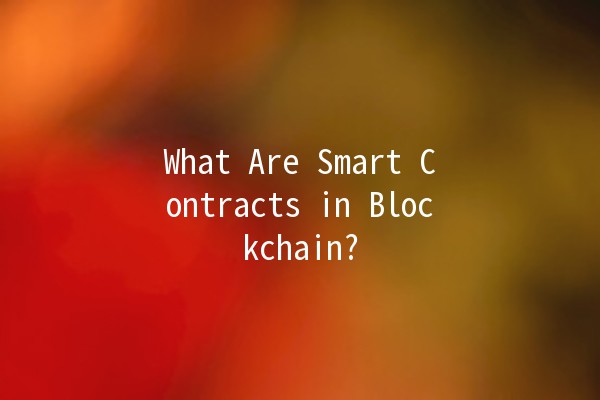




Smart contracts are a crucial innovation in the world of blockchain technology, designed to automate and enforce agreements without the need for intermediaries. As businesses and individuals increasingly explore blockchain solutions, understanding smart contracts becomes essential. This article delves into what smart contracts are, their advantages, how they operate in blockchain, and practical tips for leveraging their potential.
Smart contracts can be defined as selfexecuting contracts where the terms of the agreement are directly written into lines of code. They reside on a blockchain network, ensuring that the contract is immutable and transparent. Once deployed, smart contracts automatically enforce the agreement without human intervention.

Smart contracts function through a series of coded instructions, built on blockchain platforms like Ethereum. The essential steps involved in the operation of a smart contract include:
Smart contracts have found applications across various industries, including finance, real estate, and supply chain management. Here are some notable examples:
Smart contracts facilitate automated loans and transactions with reduced costs and time. For example, distributed ledger technologies can allow lenders to use smart contracts for instant credit approvals after required conditions are met, reducing traditional banking workflows.
In real estate, smart contracts streamline property purchases. They can ensure secure transactions by holding the buyer's funds in escrow, releasing them to the seller only when all transfer conditions are satisfied, thus minimizing fraud.
By using smart contracts in supply chains, companies can achieve better transparency and traceability. Smart contracts automate payments and verify whether goods fulfill agreed conditions before issuing them, thereby enhancing operational efficiency.
The insurance industry can automate claims processing using smart contracts. By coding specific conditions into a contract, payouts can be triggered automatically when the verified conditions are met, minimizing fraudulent claims and reducing processing time.
Smart contracts can be used for identity verification, enabling individuals to control their own data while allowing companies to validate identities without additional paperwork or long verification waits.
When working with smart contracts, optimizing productivity is essential. Here are five actionable tips:
Identify repetitive tasks that can benefit from automation through smart contracts. For instance, setting up automated payment processes tied to the completion of deliverables can save time and energy.
If you run a freelance service, setting up a smart contract for each project can automatically release your payment once the client marks the project as complete, thus eliminating followups.
Utilize smart contracts to streamline workflows between different departments or parties. Ensure all stakeholders understand how automated processes work to foster collaboration and efficiency.
For a marketing agency, integrating smart contracts with client deliverables can ensure realtime updates and payments are automatically processed once milestones are met.
Implement smart contracts to ensure all data entered is validated through the system. This helps maintain the integrity of the information shared among parties.
When managing contracts with clients, use smart contracts to validate data entries. For example, if a contract specifies deliverables within a set timeline, the contract would only accept projects labeled with specific verifiable deadlines.
Incorporate analytics tools that track smart contract performance. Analyze execution delays, transaction volumes, and other metrics to identify areas for improvement.
A logistics company utilizing smart contracts can analyze data on delivery times and payment execution to determine inefficiencies and optimize its supply chain process.
Training your team on smart contract technologies can foster innovation. Understanding the capabilities and limitations of smart contracts can lead to more effective implementations.
Organize workshops for your employees on blockchain and smart contract technology to promote understanding and encourage innovative solutions within your organization.
Smart contracts are automated and executed on blockchain technology, while traditional contracts often require manual enforcement through legal systems or intermediaries. This automation saves time and reduces potential errors.
Generally, smart contracts are considered legally binding if they meet the essential elements of a contract: offer, acceptance, and consideration. However, legal recognition varies internationally and may require additional documentation in certain jurisdictions.
Smart contracts are secured by blockchain technology. However, vulnerabilities may arise from flaws in the contract's code. Regular audits and hiring experienced developers can mitigate these risks.
If a smart contract’s code is structured correctly, breaches should ideally lead to failsafes that prevent further transactions. However, the recourse for a breach can depend on the specific contract terms initially agreed upon.
Typically, once a smart contract is deployed on a blockchain, it is immutable. However, you could design contracts with upgradeable features that allow developers to implement necessary changes under specific circumstances.
Several blockchain platforms support smart contracts, including Ethereum, Binance Smart Chain, and Hyperledger. Each platform has its specific features, so it's important to choose one that aligns with your project needs.
As we continue to evolve within the technological landscape, smart contracts represent a pivotal shift in how we conduct business and manage agreements. By leveraging their features effectively, businesses can unlock unprecedented efficiencies and reliability. The potential applications are immense, and as more industries adopt smart contract technology, we will likely witness a significant transformation across various sectors.